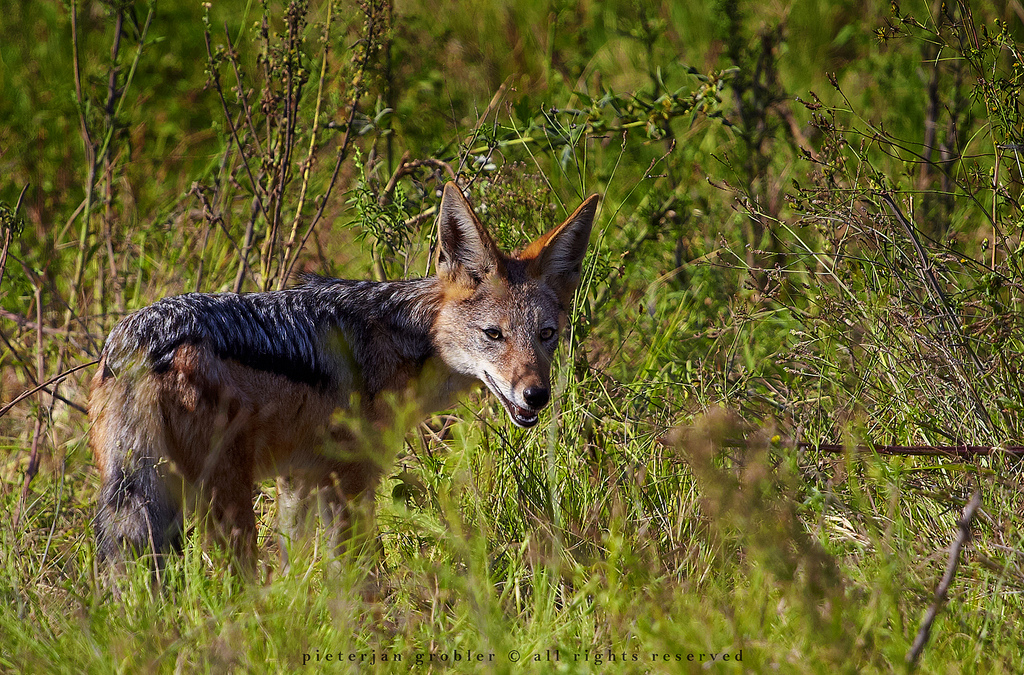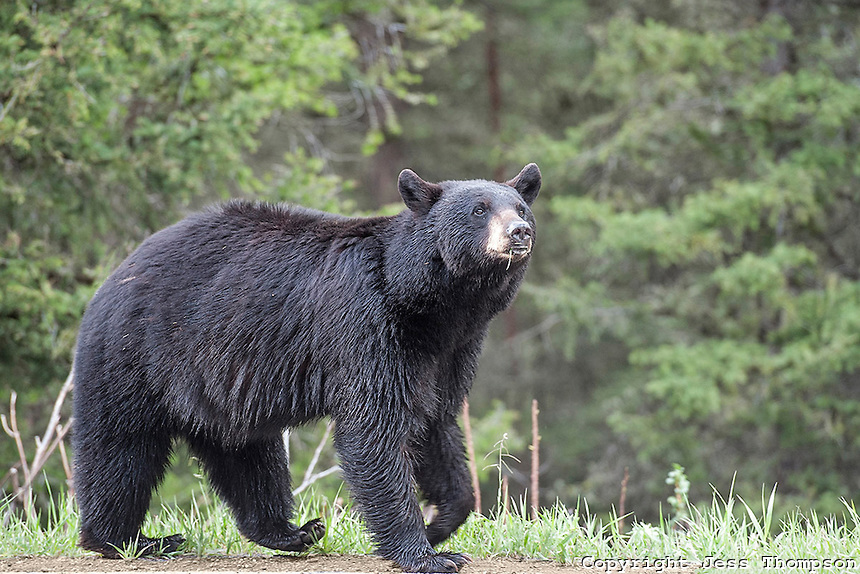Welcome to the 20th edition of Windows on Wildlife! If you have a recent post about wildlife you’d like to share – it can be anything: birds, insects, mammals – scroll down to the end of the post and add your site; a compilation of all additions will be posted the following week. Please don’t forget to link back here (I’d love it if you’d add the Windows on Wildlife button to your post which you can find on our sidebar) and visit other blogs that have articles to share. Thanks for stopping by!
Jackals have been on my mind a lot recently. I attended a spiritual retreat a few weeks ago that completely changed my life, and interestingly enough, jackals were a part of it. I’m reticent to really go into detail here about the contents of the retreat and how jackals fit in for me, as I want to keep the focus of this blog on nature and my own nature writing. I’m hoping to get my act together enough to write a blog post about my experiences on my personal blog, and will link to it here if it ever comes about.
Living, as I do, in the northeastern US, my knowledge of jackals is quite limited – despite my intense love of wild canids. But I’m feeling called to explore these animals more, and as I research them I’m delighted to find out how very coyote-like they can be. Usually I’m enough of a writer to read an article and then paraphrase it in my own writing, with appropriate references. But for a number of reasons I’m feeling it more appropriate to directly quote the article I’ve most recently read and would like to share with my readers. The program Nature on PBS did a documentary on jackals in 2000 (which I’m working on getting a copy of), and had a really fabulous article posted on their website. I couldn’t find the author, so will link directly to the article below (emphases are mine and not the author’s). Enjoy – I hope some of you learn to love this little canine as much as I have in the past few weeks!
Ancient Egyptians believed they were gods of the underworld, and that their evening yips and yowls were the haunting songs of the dead. Modern cultures dismissed them as cold-hearted and calculated killers, the vicious thugs of the animal world.
But the dog-like jackal lives a far more complicated — and challenging — life than many once believed. Indeed, jackals need all the creativity and cunning they can muster to survive on the rolling grasslands and marshes of Africa’s Ngorongoro Crater, where three species of jackal — golden, black-backed, and side-striped — struggle to raise families and find food.
Jackals, which are related to domestic dogs and wild wolves, are found in many parts of Africa, southeastern Europe, and southern Asia. And while they may be known for their taste for meat, they also get a large share of their diet from plants and insects. Some studies of golden jackals, for instance, found that nearly half of their meals consisted of plants, and that they will eat everything from eggs and frogs to grasshoppers and snakes.
Researchers have also documented that jackals, unlike most mammals, mate for life, which can last 10-12 years in the wild. They raise their young (an average litter has five pups) in carefully dug burrows. The babies are born blind, but are usually ready to care for themselves after four months, and will stay with the family until they are 18 months old. As parents, however, jackals can get some help that is a little unusual. Often, grown offspring will remain with a mating pair as helpers, assisting the family in many ways.
Cooperation isn’t limited to family life, however. When it comes to hunting, jackals also work together. Several pairs, for instance, may take turns tiring out and dragging down a gazelle. And many jackals may band together to scare a cheetah away from its kill, so they can feed on the scraps.
To coordinate such activities, jackals have a large vocabulary of calls that they use to communicate. Yips, growls, hisses, and howls all have a place in the jackal language, each sound designed to warn away strangers or welcome friends. Jackals also have remarkably expressive body language, using everything from a submissive “heads down” posture to athletic body slams to communicate their place in the pack. “A lot of their behavior is like [that of] domestic dogs,” says Sorgena. “You can know when they are content or angry just by looking at them. Jackals are much more expressive than you might expect.” And, he adds, “Much less sinister and more interesting, too.”
Article from: http://www.pbs.org/wnet/nature/episodes/jackals-of-the-african-crater/introduction/2008/.
==========================================================
I love my weekly trips to the Vermilon River, courtesy of Gary and Boom. This week they took us on an adventure down a trail newly explored to them. Be sure to check out all the amazing photography, including a really neat picture of a Blue Jay (goodness, I love corvids!) that I found particularly captivating, along with a picture of the very beautiful Boomer!
I was totally blown away by Jenny’s article on European Moose. I love learning about wildlife in different parts of the world, and had never given consideration to the idea of moose on other continents! They’re so New England to me, it was really interesting to think about them in other ecosystems.
Share your own wildlife post with us below through the link-in!





Thank you for your comment on my floral Friday post. I really enjoyed this post about the jackal. I enjoyed seeing some in East Africa once on safari but I did not know much about them. I’m surprised they are such family oriented creatures and that some stay on with a pair to help out. Very cool. Sorry I don’t have a wildlife post to link up here but I’m sure there will be others. Have a great week.
You’re welcome, and thanks for the second visit! I’m so envious of your African safari! One of my travel dreams is to do that.
Cool. I don’t know too much about jackals. I didn’t realize they were so similar to wolves.
I didn’t either – and aren’t they cute! I have to admit that part of their appeal (kind of like coyotes) is how maligned they are. Always love an opportunity to educate!